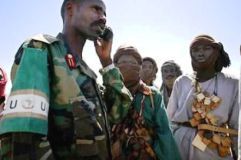African mediators hope for final peace deal in last round of Darfur talks
By DULUE MBACHU, Associated Press Writer
ABUJA, Nigeria, Dec 9, 2004 (AP) — African mediators hope for a final peace accord for Sudan’s bloodied Darfur from a third phase of talks starting Friday — despite both sides’ near-immediate violations of interim accords reached earlier.

|
|
An African Union(AU) official talks to his base by satellite phone during a meeting with Sudan Liberation Army rebels in the desert west of El Fasher, the capital of North Darfur state in this November 8, 2004. (Reuters). |
The talks — the final scheduled round of Darfur negotiations in Nigeria’s capital, Abuja — are meant to find political solutions to the causes behind a 22-month-old conflict in western Sudan’s Darfur, site of what the United Nations calls the world’s worst current humanitarian crisis.
“We hope to round it off this time around,” said one mediator, arriving in Abuja ahead of delegations of the Sudanese government and the rebel Sudan Liberation Army and Justice and Equality Movement.
An earlier round, in November, produced accords on humanitarian access to the estimated 1.6 million war-displaced in Darfur and brought new pledges of an end to hostilities. Another 200,000 Darfur refugees live in camps in neighboring Chad.
Sudan signed the accords under intense international pressure, including warnings of war-crimes prosecution and threats of U.N. sanctions. Two previous rounds of the talks, brokered by the African Union, collapsed without agreement.
Rebels drawn from the mainly agrarian, non-Arab African tribes of Darfur took up arms in February 2003, accusing Sudan’s Arab-dominated government of decades of oppression.
President Omar el-Beshir’s government is accused of unleashing Janjaweed Arab militias against the farmers, in ground attacks backed by coordinated bombing runs.
Disease and famine have killed 70,000 of the war-displaced in Darfur since March alone, the World Health Organization says. There is no official reckoning of the overall toll of the war.
Even November’s accords, which included a ban on military flights over rebel-held areas of Darfur, have failed to stop fighting, however.
Darfur rebels are largely blamed for the flare-up of fighting in recent weeks, which aid groups say drew new Sudanese government bombing raids. The government denies it.
The rapid breaching of the November deals has heightened doubts about the usefulness of any deals to come.
Any political solution would have to look at rebels’ calls for a greater share of power and resources for long-isolated Darfur.
Sudan, trying to come to terms with a separate, 21-year rebellion in the south and simmering unrest in the east, is being urged by some U.N. officials and others to grant greater autonomy to its outlying regions.
Complicating the latest talks: Two new insurgent groups not involved in the current peace process have emerged in Darfur, launching fresh attacks and threatening the security of camps for the displaced.
Khartoum says it is also willing to talk to the new groups.
Additionally, a promised 3,000-strong African Union peace deployment so far has managed to put only about 800 soldiers and 100 observers out in the field.
The United States warned Tuesday of what it called a growing humanitarian disaster in Darfur, where authorities say the number of people in immediate need of aid has now topped 2 million. The United States accused all sides of worsening the crisis.
New York-based Human Rights Watch on Thursday urged the African Union to speed up the deployment of peacekeepers and broaden their mandate to protect civilians.
“They need to secure the rural areas of Darfur as quickly as possible so that 1.8 million people can return home safely and voluntarily,” said Peter Takirambudde, Africa director at Human Rights Watch.
